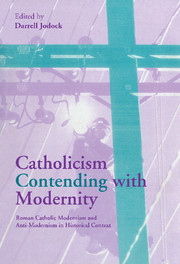 Catholicism Contending with Modernity
Catholicism Contending with Modernity Book contents
- Frontmatter
- Contents
- List of contributors
- Acknowledgments
- List of abbreviations
- Note on the text
- Introduction I: The Modernist crisis
- Introduction II: The Modernists and the anti-Modernists
- PART I THE LATE NINETEENTH-CENTURY SETTING OF MODERNISM AND ANTI-MODERNISM
- PART II MAURICE BLONDEL AND ALFRED LOISY IN FRANCE
- PART III FRIEDRICH VON HÜGEL AND MAUDE PETRE IN ENGLAND
- 8 The Modernist as mystic
- 9 English Catholicism and Modernism
- PART IV SOCIAL MODERNISM AND ANTI-MODERNISM IN FRANCE
- Conclusion
- Index
8 - The Modernist as mystic
Published online by Cambridge University Press: 30 October 2009
- Frontmatter
- Contents
- List of contributors
- Acknowledgments
- List of abbreviations
- Note on the text
- Introduction I: The Modernist crisis
- Introduction II: The Modernists and the anti-Modernists
- PART I THE LATE NINETEENTH-CENTURY SETTING OF MODERNISM AND ANTI-MODERNISM
- PART II MAURICE BLONDEL AND ALFRED LOISY IN FRANCE
- PART III FRIEDRICH VON HÜGEL AND MAUDE PETRE IN ENGLAND
- 8 The Modernist as mystic
- 9 English Catholicism and Modernism
- PART IV SOCIAL MODERNISM AND ANTI-MODERNISM IN FRANCE
- Conclusion
- Index
Summary
The questions a historian puts to his evidence determine the quality of the history he writes. Of equal importance to this quality is the level of analytic consciousness attained by the historian concerning the assumptions underlying his questions. To ask what the Roman Catholic Modernist crisis was and why it occurred when it did presupposes a number of assumptions about the ecclesial culture within which the crisis took place and about the individuals caught in the conflict. This last point about the individuals caught in the conflict is of special importance because the papal encyclical Pascendi dominici gregis not only created Modernism; it also created Modernists – as though dozens of individuals of varying ages and experiences and of a multitude of nationalities, with different degrees of religious development and levels of intellectual culture, thought with one mind and pursued one goal. The reality was rather different. No two so-called Modernists, in fact, shared more than a superficial identity; and one of them, at least, was simply unique, not only, of course, in who he was, but also in what he thought and did and why. The operative questions, then, in the task undertaken in these pages, will be: what can we know of Baron Friedrich von Hügel's personal religious development?; what was the ecclesial cultural context of this development?; and what was von Hügel's perception of and reaction to this context?
- Type
- Chapter
- Information
- Catholicism Contending with ModernityRoman Catholic Modernism and Anti-Modernism in Historical Context, pp. 215 - 247Publisher: Cambridge University PressPrint publication year: 2000


